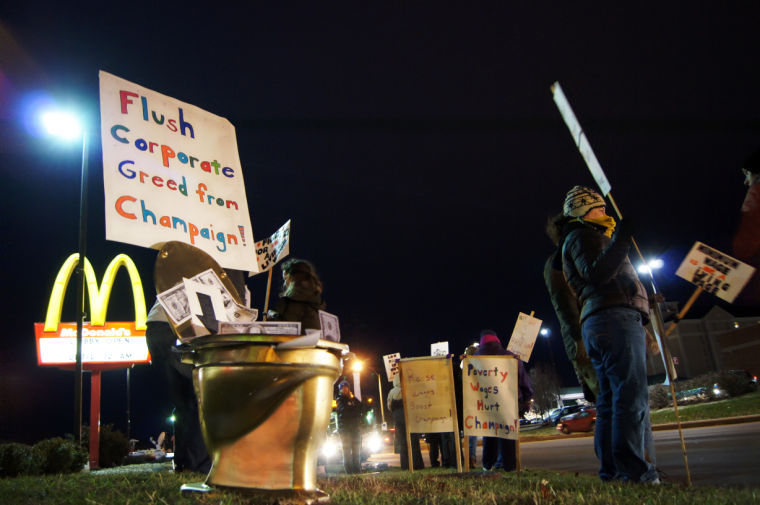Local food service workers rally for increase in minimum wage
December 6, 2013
Despite the cold, Champaign-Urbana community members stood outside the McDonald’s, located at 1605 S. Neil St., carrying signs and chanting phrases such as, “Keep your burgers, keep your fries, make our wages supersized!”
The rally was one of hundreds taking place Thursday in support of the “Fight for $15” movement. The movement seeks to raise minimum wage to $15 and give fast-food workers the right to form a union without retaliation.
Ricky Baldwin, co-chair of Central Illinois Jobs With Justice, said the movement has been gaining political strength throughout the country. On Tuesday, the Washington, D.C. City Council unanimously voted to endorse the state’s minimum wage from $8.25 to $11.50 per hour — one of the highest in the nation. The legislation will be put through a final vote and sent to the Washington, D.C. mayor, Vincent Gray.
“It would be so much better if McDonald’s and other corporations — who can afford it — would pay more,” Baldwin said. “Then those workers would have more money to spend, and it would help everybody, it would help get the economy going again.”
University physics professor George Gollin, who is running for Congress in Illinois’ 13th district, also discussed the larger economic impact low wages have.
Get The Daily Illini in your inbox!
“When you do a real full accounting of things, what you find is that to get cheaper hamburgers, cheaper goods, we’re having to put tax revenues into important programs like food stamps and other forms of aid,” he said. “You pay either right there at the counter when you buy something from a place that’s not paying its workers well, or you pay because we have to subsidize people so they don’t starve to death.”
Other than fighting for a raise in the minimum wage, fast-food workers are fighting for their right to unionize.
“A lot of times in this country when workers try to form a union, even though legally it’s a protected right, they will find themselves fired or disciplined or have their hours cut back — and the employer says it’s for another reason,” Baldwin said. “Somehow, coincidentally, it’s always the folks who are most active in trying to start the union.”
He added that even if employers are convicted of illegal anti-union activity, the fine is minimal, so large corporations like McDonald’s — who he said reported earnings of $1.5 billion last quarter — do not have to worry about such consequences.
The plight of fast-food workers does not just affect the community on an economic level, but also on a personal one.
“If people think about it, most people probably know someone or have a family member, if not they themselves, that have worked in fast-food,” Baldwin said.”All of those people are making low wages. About half of them, on average, have to rely on some kind of public assistance to get by.”
Gloria Von Behren, area chapter president of SEIU, has been part of the food service community for 30 years and is a second-generation food service worker at the University. She said she started working in military dining halls for $1.10 per hour when she was a teenager.
“We’ve got to start somewhere with bringing back what we deserve, with a job with dignity and the opportunity to get ourselves above what it costs us to live,” she said. “There is too wide of a disparity between what minimum wage is, what cost-of-living is and what a living wage is. If they continue to bring those definitions closer together, we may not have an issue.”
With this movement, Von Behren is looking to make changes to the way that fast food workers are viewed and treated by corporations.
“They can’t tell me that it’s an uneducated person, they can’t tell me that it’s an entry-level position, don’t demean my profession,” she said. “If [employers] think their floor is our ceiling, we will raise the roof.”
Eleanor can be reached at [email protected]







